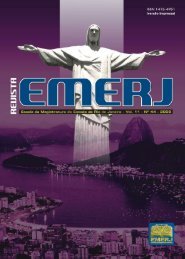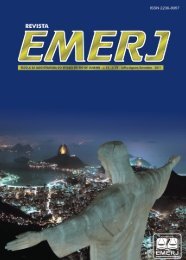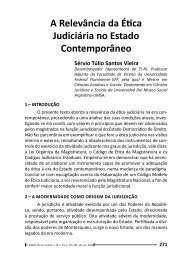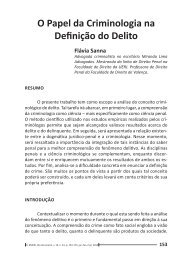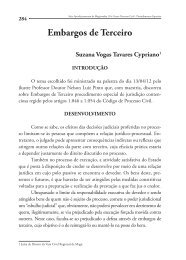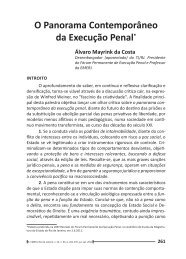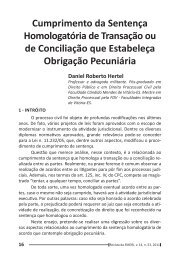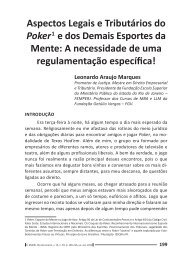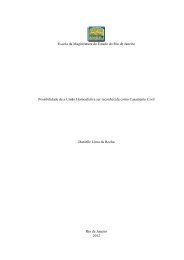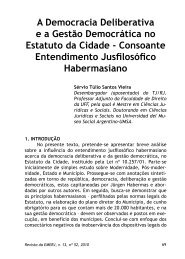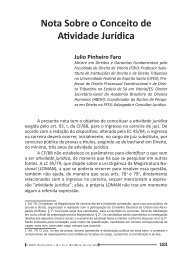10 Anos da Revista EMERJ - Emerj - Tribunal de Justiça do Estado ...
10 Anos da Revista EMERJ - Emerj - Tribunal de Justiça do Estado ...
10 Anos da Revista EMERJ - Emerj - Tribunal de Justiça do Estado ...
Create successful ePaper yourself
Turn your PDF publications into a flip-book with our unique Google optimized e-Paper software.
a) o interesse protegi<strong>do</strong> 6 : as nuli<strong>da</strong><strong>de</strong>s 7 protegeriam o interesse<br />
social ou público; e as anulabili<strong>da</strong><strong>de</strong>s buscariam somente o interesse<br />
priva<strong>do</strong> <strong>da</strong>s partes que firmaram o negócio jurídico 8 ;<br />
b) legitimi<strong>da</strong><strong>de</strong> <strong>de</strong> argüição: enquanto as nuli<strong>da</strong><strong>de</strong>s po<strong>de</strong>riam<br />
ser invoca<strong>da</strong>s por qualquer interessa<strong>do</strong>, mesmo o Ministério Público,<br />
as anulabili<strong>da</strong><strong>de</strong>s somente po<strong>de</strong>riam ser argüi<strong>da</strong>s pela parte que<br />
firmou o negócio e que por elas foi prejudica<strong>da</strong>;<br />
c) atuação jurisdicional: as nuli<strong>da</strong><strong>de</strong>s po<strong>de</strong>riam ser julga<strong>da</strong>s e<br />
<strong>de</strong>clara<strong>da</strong>s <strong>de</strong> ofício pelos magistra<strong>do</strong>s; já as anulabili<strong>da</strong><strong>de</strong>s somente<br />
po<strong>de</strong>riam ser analisa<strong>da</strong>s após provocação <strong>da</strong> parte legitima<strong>da</strong> para<br />
argüi-las;<br />
d) eficácia <strong>da</strong> <strong>de</strong>claração judicial: que, tratan<strong>do</strong>-se <strong>de</strong> nuli<strong>da</strong><strong>de</strong>s,<br />
teria efeitos retroativos, e, quan<strong>do</strong> <strong>de</strong> anulabili<strong>da</strong><strong>de</strong>s, somente a<br />
partir <strong>da</strong> <strong>da</strong>ta em que for proferi<strong>da</strong>;<br />
e) convalescimento pelo <strong>de</strong>curso <strong>do</strong> tempo: também impossível<br />
nos negócios eiva<strong>do</strong>s <strong>de</strong> nuli<strong>da</strong><strong>de</strong>, mas ocorrente naqueles vicia<strong>do</strong>s<br />
por anulabili<strong>da</strong><strong>de</strong>s;<br />
f) possibili<strong>da</strong><strong>de</strong> <strong>de</strong> ratificação: impossível quan<strong>do</strong> se trata <strong>de</strong><br />
nuli<strong>da</strong><strong>de</strong>s, o contrário ocorren<strong>do</strong> nas anulabili<strong>da</strong><strong>de</strong>s.<br />
Valen<strong>do</strong>-se <strong>de</strong>ssa teoria geral, restaria ao intérprete, no caso<br />
concreto, apenas <strong>de</strong>finir se o vício inci<strong>de</strong>nte sobre o negócio jurídico<br />
sob sua análise seria uma nuli<strong>da</strong><strong>de</strong> ou anulabili<strong>da</strong><strong>de</strong>, pois to<strong>da</strong>s<br />
as conseqüências <strong>da</strong>í advin<strong>da</strong>s, especialmente a forma <strong>de</strong> se atuar<br />
frente ao problema, seriam <strong>da</strong><strong>da</strong>s pelas distinções acima<br />
estabeleci<strong>da</strong>s. Dessa pratici<strong>da</strong><strong>de</strong> na operacionalização <strong>da</strong>s normas,<br />
bem como <strong>da</strong> facili<strong>da</strong><strong>de</strong> proporciona<strong>da</strong> ao estu<strong>do</strong> <strong>de</strong>sse instituto, é<br />
que <strong>de</strong>corre o senti<strong>do</strong> <strong>de</strong> se buscar uma teoria geral <strong>da</strong>s invali<strong>da</strong><strong>de</strong>s.<br />
To<strong>da</strong>via, como <strong>de</strong>dutivo, qualquer teoria geral somente se mostra<br />
apta a cumprir esse papel se não apresentar incoerências. E se a<br />
6 Distinção realiza<strong>da</strong> por AMARAL (ob.cit.), MATTIETTO, Leonar<strong>do</strong> <strong>de</strong> Andra<strong>de</strong>. “Invali<strong>da</strong><strong>de</strong> <strong>do</strong>s atos e negócios<br />
jurídicos”. In Tepedino, Gustavo (coord.). A Parte Geral <strong>do</strong> Novo Código Civil. Rio <strong>de</strong> Janeiro: Renovar, 2007,<br />
PEREIRA (ob. cit.) e TEPEDINO, Gustavo; BARBOZA, Heloísa; MORAES, Maria C. B. Código Civil Interpreta<strong>do</strong>. Rio<br />
<strong>de</strong> Janeiro: Renovar, 2004. V. 1, 765 p.<br />
7 Para se evitar mal-entendi<strong>do</strong>s, a partir <strong>de</strong>ste ponto se referirá às nuli<strong>da</strong><strong>de</strong>s em senti<strong>do</strong> específico apenas pela<br />
expressão "nuli<strong>da</strong><strong>de</strong>s", e às nuli<strong>da</strong><strong>de</strong>s em senti<strong>do</strong> genérico pelo termo "invali<strong>da</strong><strong>de</strong>s".<br />
8 As <strong>de</strong>mais distinções - exceto as <strong>da</strong> alínea "d" e "e", com a qual não concor<strong>da</strong>m Tepedino, Barboza e Moraes e,<br />
respectivamente, Pereira - são propostas em AMARAL, COELHO e PEREIRA.<br />
148 <strong>Revista</strong> <strong>da</strong> <strong>EMERJ</strong>, v. 11, nº 41, 2008



